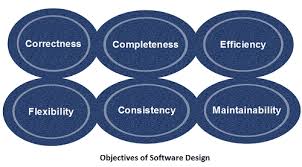Exploring the Significance of Software Design in Software Engineering Practices
The Importance of Software Design in Software Engineering
Software design plays a crucial role in the field of software engineering. It is the process of defining the architecture, components, interfaces, and other characteristics of a software system to meet specified requirements. Effective software design is essential for creating high-quality, scalable, and maintainable software applications.
Key Aspects of Software Design
Software design involves several key aspects that are critical to the success of a software project:
- Architectural Design: This phase focuses on defining the overall structure of the software system, including its components, modules, and relationships. A well-designed architecture provides a solid foundation for the rest of the development process.
- Interface Design: Interfaces are crucial for communication between different parts of a software system. Good interface design ensures that components can interact seamlessly and efficiently.
- Data Design: Data is at the core of many software applications. Data design involves defining data structures, storage mechanisms, and access methods to ensure efficient data processing and retrieval.
- Algorithm Design: Algorithms are essential for solving complex problems efficiently. Algorithm design focuses on developing effective algorithms that meet performance requirements and optimize resource utilization.
The Benefits of Good Software Design
Effective software design offers several benefits to both developers and end-users:
- Scalability: A well-designed software system can easily accommodate changes and additions without requiring extensive rework.
- Maintainability: Good design practices make it easier to maintain and update software systems over time, reducing maintenance costs and effort.
- Reliability: Properly designed software systems are more reliable and less prone to errors or failures, leading to improved user satisfaction.
- Performance: Well-designed algorithms and data structures can enhance the performance of a software application, ensuring optimal speed and efficiency.
In Conclusion
Software design is a fundamental aspect of software engineering that significantly impacts the quality, scalability, and maintainability of software applications. By investing time and effort into effective design practices, developers can create robust systems that meet user needs and stand the test of time.
Key Questions Answered: Understanding Software Design in Software Engineering
- What is software design in software engineering?
- Why is software design important in software engineering?
- What are the key aspects of software design?
- How does architectural design contribute to software development?
- What role does interface design play in software engineering?
- Why is data design crucial in developing a software application?
- How can good algorithm design impact the performance of a software system?
What is software design in software engineering?
Software design in software engineering refers to the process of conceptualizing and defining the architecture, components, interfaces, and characteristics of a software system to meet specific requirements. It involves making critical decisions about how the software will be structured, how its components will interact, and how data will be managed and processed. Effective software design is essential for creating robust, scalable, and maintainable software applications that deliver value to users. By focusing on aspects such as architectural design, interface design, data design, and algorithm design, software engineers can ensure that the resulting software system meets performance objectives and user expectations.
Why is software design important in software engineering?
Software design is crucial in software engineering because it serves as the blueprint for developing high-quality, efficient, and reliable software applications. By carefully planning the architecture, components, interfaces, and data structures of a system during the design phase, software engineers can ensure that the final product meets user requirements and performs optimally. Good software design facilitates scalability, maintainability, and extensibility of the software, making it easier to adapt to changing needs and technologies in the future. Ultimately, effective software design lays the foundation for successful software development projects by guiding developers in creating solutions that are well-structured, robust, and easy to maintain.
What are the key aspects of software design?
When discussing the key aspects of software design in software engineering, it is essential to highlight several critical components that contribute to the successful development of a software system. These key aspects include architectural design, interface design, data design, and algorithm design. Architectural design focuses on defining the overall structure and components of the system, while interface design ensures seamless communication between different parts. Data design involves structuring data for efficient processing and retrieval, and algorithm design aims to develop effective algorithms for problem-solving. By addressing these key aspects thoughtfully during the software design phase, developers can create robust and scalable software solutions that meet user requirements effectively.
How does architectural design contribute to software development?
Architectural design plays a crucial role in software development by providing a blueprint for the overall structure and organization of a software system. It defines the components, modules, interfaces, and relationships within the system, laying the foundation for the development process. A well-thought-out architectural design enables developers to better understand the system’s complexity, make informed decisions about technology choices, and ensure that the system meets functional and non-functional requirements. By establishing a clear structure early on, architectural design helps streamline development efforts, promote code reusability, facilitate collaboration among team members, and ultimately contribute to the creation of scalable, maintainable, and high-quality software applications.
What role does interface design play in software engineering?
Interface design plays a crucial role in software engineering by serving as the bridge between different components of a software system. Interfaces define how various parts of the system communicate and interact with each other, ensuring seamless operation and efficient data exchange. A well-designed interface simplifies the complexity of the underlying system, making it easier for developers to work on different modules independently. Additionally, user interfaces play a vital role in software design by providing users with intuitive ways to interact with the application, enhancing user experience and usability. In essence, interface design is essential for fostering collaboration among developers, improving system reliability, and creating user-friendly software products.
Why is data design crucial in developing a software application?
Data design is crucial in developing a software application because it forms the foundation for efficient data processing and management within the system. Proper data design involves defining data structures, storage mechanisms, and access methods that optimize performance and ensure data integrity. By carefully planning and implementing data design principles, developers can enhance the scalability, reliability, and maintainability of the software application. Effective data design enables seamless data retrieval, manipulation, and storage, ultimately improving the overall functionality and user experience of the software system.
How can good algorithm design impact the performance of a software system?
Good algorithm design plays a critical role in shaping the performance of a software system. By developing efficient algorithms that optimize resource utilization and minimize computational complexity, software engineers can significantly enhance the speed and efficiency of a software application. Well-designed algorithms can reduce processing time, improve responsiveness, and enable the system to handle larger datasets or higher workloads without compromising performance. In essence, good algorithm design lays the foundation for a high-performing software system that delivers optimal results to users while maximizing computational resources.





